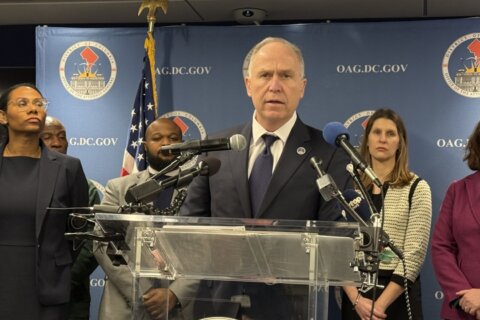The national eviction moratorium expired Saturday and on July 25, the District’s local ban on evictions, tied to Mayor Muriel Bowser’s public health emergency declaration, also expired, leaving thousands of D.C. residents on the edge of losing their home.
The national moratorium doesn’t provide funding for rental relief or for late fees for those who paid rent late or didn’t pay rent at all.
In April, Bowser’s office launched STAY DC, a rental assistance program meant to shore up residents during the public health emergency.
However, some residents said they’re finding the program challenging.
Taniya Rogers, a 5-year resident of the District, said she applied for the STAY DC rental and utility assistance program in May, but it took her nearly two weeks to complete the form.
“I’m a 30-year-old educated woman and the fact it took me that long to fill out the application was kind of worrisome,” Rogers said.
Rogers, who worked as a safety technician for the District Department of Transportation (DDOT) helping students safely cross at intersections, said she lost her job when the city issued a stay-at-home order in response to the pandemic.
“They were paying us up to a certain point, which I think was the summer,” she said. “Usually in the summer, they stop paying us and [I] had to apply for unemployment.”
Her employer offered Rogers a return to work when D.C.’s Canvas Academics and Real Engagement classrooms reopened — a program that provided supervised virtual learning and allowed a small group of students to learn inside a school.
“I was unable to do that because I do have two small children, who are minors, and the other parent in our home is no longer here. He passed away a few years ago,” she said.
She said her supervisor was unsympathetic. By November of 2020, Rogers’ unemployment was cut off. Rogers then used her savings to pay rent through 2021.
“I paid those last two months of rent that I had, I didn’t have any more money. I had to start doing Uber Eats with my kids in the car with me. And that kind of became a bit of a like a safety concern. And I would say recently, my car brake fell off. So, I haven’t been doing Uber.”
While Rogers said she made efforts to keep up with her rent payments, she eventually fell behind.
When the District of Columbia launched the STAY DC program in April, its aim was keeping residents like Rogers from losing their homes. But tenants in the District have struggled to secure rent relief through the program.
The lengthy process has felt almost impossible for those who have limited access to the internet, face technological barriers or don’t speak English. For others like Taniya, it’s an arduous process that needs to be easier to navigate.
The District has opened several clinics throughout the city to help with the application process. Those clinics opened on July 30, five days after the District’s eviction moratorium expired.
Several advocates are expressing concerns with the District’s ability to distribute the STAY DC federal aid.
Nikki Del Casale, co-coordinator for Cancel Rent DC — an organization aimed at preventing evictions in the District — said if the city doesn’t “spend at least 65% of it by the end of September, D.C. forfeits the rest of the federal money. So, there’s a clock for this.”
Funding for the STAY DC program comes from the December Congressional Appropriations Act, and the District launched the program in April with $350 million dollars in funding. Since the first week in July, D.C. has distributed just 10% of the money and if the funds aren’t distributed by the use-it-or-lose-it deadline, the city may not be allowed to keep the remaining money.
Taniya Rogers, also an advocate with Cancel Rent DC, said difficulty with the STAY DC program or back rent aren’t the only concerns.
“There are a lot of issues within the apartment itself. I live in slum conditions and I paid my rent through 2020.”
She said the water coming from the pipes in the building is brown.
“This has been going on way before COVID came into the picture. You can see it that much more at this point because people don’t have anything now,” Rogers said. “They were OK with trying to pay their rent and unfortunately living the way they were. Now, they don’t have the money, and you’re already not living in a good area. How do you think I feel not knowing when my next $5 is going to come so I can go and buy water?”
Rogers is currently employed with the Foster & Adoptive Parent Advocacy Center working in their Families Growing Stronger Together program as a mentor to parents who adopt children of color.
“So I have that job, but I don’t get paid that much — but I get paid something,” she said.
In the meantime, Rogers has received STAY DC rental assistance through May, but said she’s still three months behind on rent and will resubmit another application for assistance.
“I didn’t apply future months. That was the part that didn’t make sense,” Rogers said. “I am worried that I might be evicted. I have two kids, where are we going to go?”








